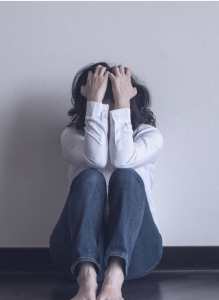SUICIDE & MENTAL HEALTH
IN A PANDEMIC
As we navigate our way through our sixth lockdown in Victoria, we have noted a decline in the mental health of our community. The uncertainty of lockdowns end has caused greater worry and fear of what impact this will all have. Strains of working from home or home schooling, or both; has intensified the home environment. This combination of stressors has led to increased anxiety or feelings of low mood.
There have been multiple reports in the media about suicide rates during the pandemic. These reports are in response to growing numbers of people accessing crisis services and suicide support lines. Rates of support being provided and the number of people seeking support has rapidly increased during this period. These services have played a vital role in protecting our community and keeping suicide rates within average levels.
We know that the pandemic and lockdowns have taken a significant toll on the mental health of our nation. Unemployment, and isolation were identified as factors likely to lead to increased rates of suicide related deaths. While the expectation was high, and there were clear reports of a increase in mental health services; the data has revealed that there was no consistent evidence of a rise in suicide rates during the pandemic.



In a world study looking at the pandemic from April to July 2020, it was shown that rates of suicide were unchanged or declined during this period. Separate research has shown a rise in distress within the community, a reduction in suicide related hospital visits, and a rise in suicidal thoughts. This information collected from the ‘living systematic review’ uses the most up to date research to synthesis the evidence on suicide related deaths. Rates of suicide across the world have remained unchanged through the pandemic.
No death by suicide is an acceptable death. Our rates of suicide in Australia remain too high (see our article on suicide prevention for more satistics). While these statistic around suicide give us some hope that the support is helping to prevent a rise in suicide rates, it is important to recognise that this does not diminish the impact that the pandemic has had on the general wellbeing and mental health of the population. There has been a rise in psychological distress, and the use of crisis services. These high rates reflect growing mental health issues.
Distress surrounding the pandemic has caused higher rates of mental illness and more people than ever are experiencing mental health issues. The increased psychological distress has resulted in an increase of suicidal thinking. However, the vast majority of these people will never experience a suicide attempt. This does not mean that their distress is not real. Various factors will provide protection for someone experiencing mental health issues that will support them with managing their health.
To help with managing this time it can be helpful to build a routine. Have a regular schedule that includes exercise, engaging with others (phone, video or other), a sleep routine, set times for work (so that you don’t end up working all day everyday), rest, and time for enjoyable activities such as hobbies.
We would like to acknowledge the hard-working people providing assistance on the crisis support lines during this challenging time.
Check out our other posts via the news page on our website. Follow us on social media to make sure you don’t miss future posts with information and ideas on managing lockdown.









